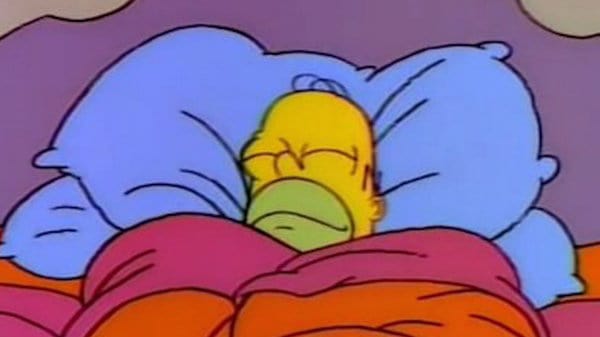
There are very few universal truths when it comes to health. We can argue the benefits of this diet versus that diet, this training program versus that training program forever and still get nowhere. But one thing we can all agree on is the importance of sleep. Tons of people are sleep deprived, and if you’re reading this you may be one of them. You may have even accepted it and learned to function despite it. Sorry to break it to you, but you’re not Jocko Willink. Us normal folk need at least 7 hours to not only perform our best, but attain optimal health.
Some of the tips in this article may seem obvious, but are you really doing them? Probably not. It’s not a big ask, these are things you can implement today to improve both your sleep quality and ability to fall asleep quickly. Ideally you’ll be able to sleep through the night without disturbances to your sleep cycle. I’m not asking you to take a walk in the woods for an hour to wind down or start taking cold showers to manipulate stress hormones. I’m not even asking you to go out and buy blackout curtains. These are three very easy-to-implement strategies that do not require dramatic lifestyle changes.
1. Eliminate Blue Light
The light that is emitted from your phone, computer, and television is called “blue light.” Your body has natural circadian rhythmic process that tells us when it’s time to be awake and when it’s time to sleep. At night you begin to produce melatonin, a hormone from the brain that tells helps us relax and fall asleep. The blue light from these gadgets disrupts our melatonin production which in turn negatively affects our sleep quality. Think about it this way; it’s 8pm and your body should be primed to sleep but the bright light from your phone fools it into thinking it’s time to wake up.
The best practice would be to completely avoid blue light at least one hour before you plan to go to sleep. Honestly, is it necessary to check your email or Facebook for the thousandth time? Save your passive aggressive anger toward your buddy posting another vacation photo while you get ready for work later. There is also a program called f.lux that you can download to your computer. This program automatically limits the blue light emitted from your computer based on what time zone you reside in. You’ll notice your screen has an orange hue when it takes effect. If you own an iPhone, go to Settings/Display & Brightness/Night Shift and turn it on. You’ll notice the same shift in light that f.lux provides.
2. Shift Your Carbohydrate Consumption to Night
Carbohydrates can increase serotonin, a neurotransmitter in the brain involved with regulating mood, sleep, appetite, digestion, among other things. I’m not telling you to consume more carbohydrates, I’m telling you to eat a greater proportion of your carbohydrates at night. If you consume 4 meals a day with 50g of carbs in each, maybe make your last meal 100g of carbs and skip the carbs with breakfast to compensate. Make sure you have a source of carbs that’s easy to digest and easy on the stomach. Having a meal that sits heavy in your stomach late at night would totally defeat the purpose.
3. Don’t Consume Caffeine After 4pm
Caffeine is the most widely used central nervous system stimulant in the world. As a society, we are probably over reliant on it just to get through a normal day. I get it, you’re one of those guys that can have a double espresso after dinner and fall right asleep. But what’s the quality of that sleep? Caffeine has a half life of about 4-6 hours depending on the person. Even though you may not feel the effects of it, it’s still in there. There are actually tests that can tell you if you are a fast or slow metabolizer of caffeine. The results can vary wildly from person to person. To play it safe, I wouldn’t advise caffeine consumption after 4pm. The irony of it all is that our sleep patterns are disrupted by caffeine and yet we use it because we don’t get enough. It’s a vicious cycle.
Bonus: Supplements
We touched on melatonin in the beginning, and as you may have seen there are melatonin supplements on the market. These are hit or miss for most people, personally they make me feel groggy the next morning which totally defeats the purpose of taking it in the first place. Also, I’d rather not be reliant on a supplement just to get to sleep every night.
ZMA is another supplement used as a sleep aid, although this is usually only effective in individuals who have a mineral deficiency.
Life is stressful. Stress affects our sleep. There’s no reason why you shouldn’t at least try some or all of the tactics laid out in this blog. If you won’t do it for your productivity, at least do it for your gains. Sleep is crucial for workout recovery. If you can’t recover, you can’t grow or train to your best ability. So double up on those potatoes at dinner, turn your phone off, skip the late afternoon coffee and get to bed.
Recent Posts
Stretching Before Workouts: Essential Warmup or Performance Killer
“Don’t stretch before workouts, your muscles become too supple” “Stretch before your workouts, warming up is important” It's conflicting advice like this that drives people crazy,...
Best Protein Bar For the Money | Cost Effective, High Quality
Protein bars are no longer a supplement dedicated to diehard gym rats, with awful taste and the consistency of a brick. Men, women, and even teenagers can commonly be seen eating protein bars. The...
